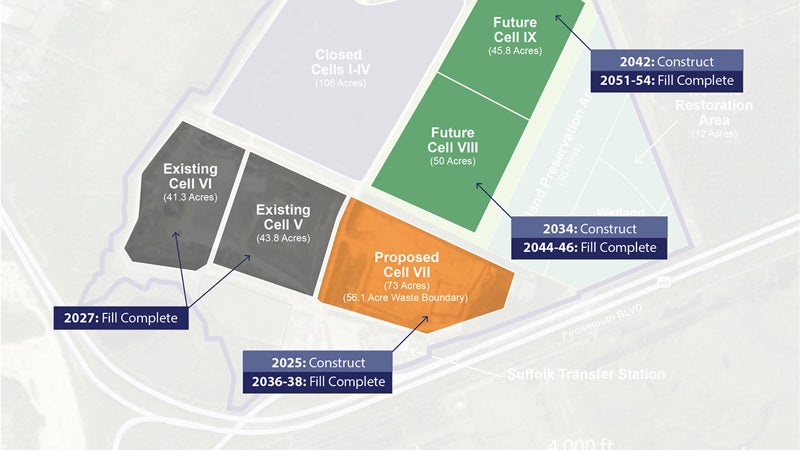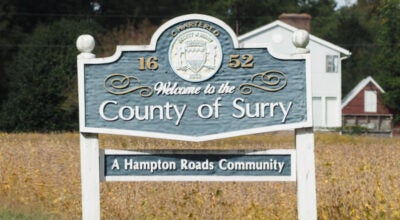Bids for SPSA landfill alternative arrive
Published 5:11 pm Friday, May 3, 2024

- A map of SPSA’s regional landfill at Bob Feller Drive in Suffolk shows cells one through four having been closed, the 43.8-acre cell five and 41.3-acre cell six each being full by 2027, and a proposed cell seven tentatively beginning construction in 2025. (Image courtesy of SPSA)
Bids proposing alternatives to the Southeastern Public Service Authority’s near-capacity Suffolk landfill are in but staying secret for now.
SPSA, which operates the regional landfill on behalf of Isle of Wight County and seven other Hampton Roads localities, solicited proposals due May 1 from companies looking to fill the void come June 30 when the WIN Waste, formerly Wheelabrator, waste-to-energy plant that had been diverting more than 70% of the region’s municipal waste from the landfill shutters.
SPSA learned in 2020 that the Navy would, by mid-2024, end its $10 million contract with the Portsmouth plant for steam to power Norfolk Naval Shipyard and instead build its own natural gas plant. WIN Waste officials, that same year, determined the plant would be unable to stay in business through the 2027 end date of its contract with SPSA absent the Navy revenue.
A 2022 fire at WIN Waste reduced the Portsmouth plant’s capacity by more than half, sending an extra 1,250 to 1,400 tons of waste per day to the landfill. SPSA has contracted with the Atlantic Waste Disposal landfill in Sussex County, 46 miles away, to temporarily absorb the influx but projects the Suffolk landfill will fill up by 2027 unless expanded or an alternative is found.
SPSA’s Board of Directors, composed of eight governor-appointed members and another eight appointed by each member locality, issued a request for information in November, followed by the request for proposals in February that was due May 1. Isle of Wight’s representatives include County Administrator Randy Keaton, and the board’s current chairman, Dale Baugh.
“A Request for Information (RFI) is an informal process that seeks information on vendors’ interests and requirements for potential future procurement opportunities,” said Tressa Preston, director of administration for SPSA. “A Request for Proposals (RFP) is a formal competitive procurement vehicle that seeks proposals from vendors under a specific scope of work with clearly defined requirements and evaluation guidelines. The RFP process is outlined in the Virginia Public Procurement Act.”
SPSA, which tentatively plans to select a bidder by December and sign a contract by April 2025, contends that until an intent to award is issued the formal proposals are “outside the scope” of Virginia’s Freedom of Information Act to “protect contract negotiations.”
Could recycling return?
The city of Franklin, SPSA’s smallest member, and the town of Smithfield each ended their curbside recycling contracts with Bay Disposal in 2021, contending most of what was being collected was being incinerated at WIN Waste rather than repurposed. Isle of Wight County also stopped recycling plastic, paper and glass at its eight municipal refuse and recycling centers in 2022. Chesapeake also ended its curbside recycling contract with Bay competitor TFC Recycling in 2022, but opened eight recycling drop-off centers throughout the city in 2023 amid backlash over the curbside program’s cancellation.
TFC was one of 10 companies to respond to SPSA’s November RFI, several of which proposed methods of separating recyclables from municipal waste streams.
Bulk Handling Systems, another responder to the RFI, proposed building an “integrated material and energy recovery facility” that would use artificial intelligence to sort recyclables from trash “at speeds and quality rates exceeding human sorters.”
Oregon-based BHS, whose subsidiary Total Fiber Recovery operates a paper recycling facility in Chesapeake, is proposing what it terms a “public-private partnership” that could entail building a facility on land supplied either by SPSA or BHS and opportunities to share the revenue generated by the recycling of cardboard, mixed paper, plastics No. 1-7, aluminum and glass.
Vermont-based CarbonSweep LLC proposes building three separate facilities – one in Chesapeake, one at the Suffolk landfill and a third in Virginia Beach – that could collectively divert up to 65% of the region’s municipal waste per year from entering the landfill by capturing 30,000 tons of recyclables annually, and producing over 90,000 tons per year of “engineered feedstock” such as diesel fuel made from food waste.
SPSA Executive Director Dennis Bagley estimates roughly 20% of households in SPSA’s service area were making use of their recycling bins when curbside services were in place, with only 60% of what was thrown into the bin actually able to be recycled.
State law requires localities and regional bodies like SPSA with 100 or more people per square mile to recycle at least 25% of the municipal waste they collect.
Bagley declined to divulge the specific tonnage or percentage SPSA has recycled to date for the 2023-24 fiscal year but told Isle of Wight County on May 2 SPSA was “struggling this year as a region to reach the state’s 25% mandate.”
Most responders to the November RFI, however, are proposing a three-year construction timeline if a contract is signed, meaning the landfill could reach capacity before the alternative begins operating. And none would come cheap.
The cost
CarbonSweep has tentatively estimated a $275 million upfront cost for design, engineering, procurement and construction plus $4 million per year per facility to pay the salaries of over 100 full-time employees at each.
The estimate isn’t out of line, according to Bagley, who told the supervisors his engineers have estimated an upfront cost anywhere from $250 million to $500 million.
The risk is, if official bids come back too high, one or more of SPSA’s member localities could opt to pull out of the regional body when all eight members’ current 10-year use and support agreements with SPSA expire on June 30, 2027. The term of SPSA membership renewals will likely be lengthened to match the 20- to 25-year contracts the RFI responders have proposed. Keeping SPSA unified is beneficial for all, Bagley contends.
“Once you walk out of SPSA, you don’t have that regional landfill; this is why the regional landfill is so important, why we need to extend the life of that,” Bagley said. “If you’re negotiating a contract without any other options you’re going to get taken advantage of.”
Member localities might not feel the financial impact in the short term. SPSA is proposing to reduce the tipping fee it charges its member localities, which is currently at $67 per ton, to $65 per ton come the July 1 start of the 2024-25 fiscal year, and, according to Bagley, could drop to $58 per ton within the next 10 years.
“That’s considering nothing changes now; things are going to change,” Bagley said, assuring Isle of Wight’s supervisors that, “when we go through this process it is with the intention of bringing back a contract that every member can accept.”
Landfill expansion issues
Expanding SPSA’s landfill to absorb the influx from the loss of WIN Waste, along with being the least environmentally friendly, comes with its own share of costs and delays.
SPSA had a collective 1.8 million cubic yards of airspace as of December available in its regional landfill’s cells 5 and 6, which are the two on track to be full by April 2027. Plans are in the works to open a seventh cell by 2027 that is already permitted and would extend the landfill’s life expectancy through 2037.
SPSA has petitioned the Army Corps of Engineers for permission to build two additional cells, 8 and 9, on 109 acres of wetlands.
“We’ve been fighting this battle for about four years to get a wetlands permit; we still don’t have it,” Bagley said.
To date, SPSA has spent $3.2 million on the permitting process.
Bagley said he’s hopeful the Army Corps will decide in SPSA’s favor this summer now that SPSA has made a concession. In exchange for permission to build cells 8 and 9, SPSA’s board recently agreed to shelve its plans for cells 10-12 to eliminate an additional 167 acres of wetlands impacts. That means no more expansions will be possible come 2061 when cells eight and nine are projected to reach capacity.
“We’ve got to stop thinking about what is the absolute cheapest way of managing our waste; the cheapest way of managing our waste is put it in the ground, but the fact of the matter is there’s not enough ground to put it in,” Bagley said.





